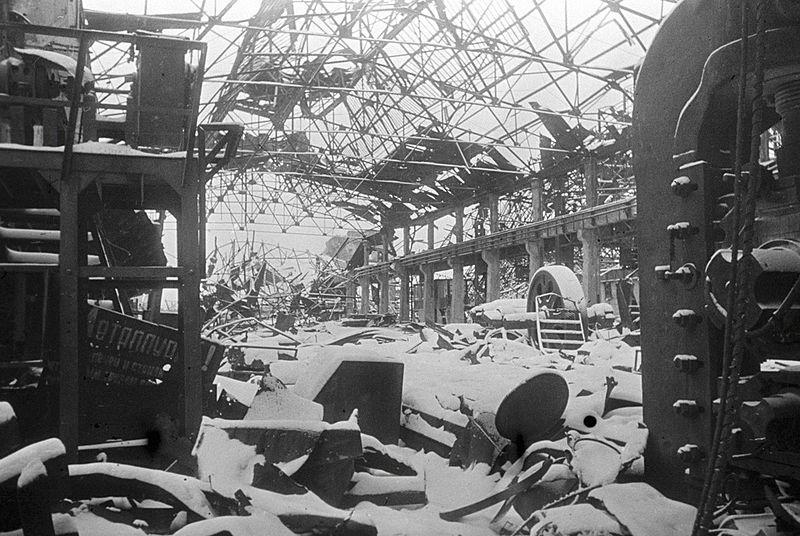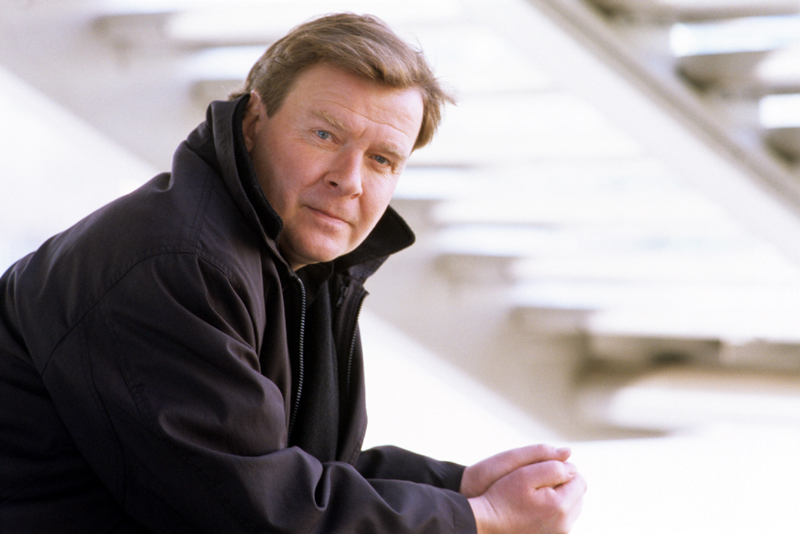Bavouzet, LPO, Jurowski, Royal Festival Hall | reviews, news & interviews
Bavouzet, LPO, Jurowski, Royal Festival Hall
Bavouzet, LPO, Jurowski, Royal Festival Hall
Shostakovich's greatest war requiem, a modern masterwork and scintillating Prokofiev

Comparisons, even on paper, between two season openers from London orchestras could hardly have been more instructive.
As for the Shostakovich symphony in each concert, I don’t doubt that Gergiev still has the mastery he always showed in the colossal Tenth (though he encourages a lamentable comparison between his own relationship with a totalitarian regime and Shostakovich’s, which was not always recklessly heroic but in which the composer, in even harder circumstances, nearly always stayed silent if he couldn’t make a stand). Jurowski, who made an impressive speech before a Moscow performance of Britten’s War Requiem earlier this year including clear statements about the composer’s good-as-marriage with Peter Pears and Wilfred Owen’s homosexuality, was right in his dignified spoken introduction to draw comparisons between that towering work of genius and another in the symphonic sphere, Shostakovich’s Eighth of 1943.
The held chord at the end was as spellbinding as I’ve ever heard it
This was a whiplash interpretation, swift to scorch and devastatingly focused to move inexorably towards the shattering centre of the vast opening Adagio and then on via goosestepping parody to Shostakovich’s greatest chain of three interlocked movements: the relentless toccata, which can be frightening at a dogged pace but was simply terrifying taken as fast as violas and brass could play it, the slowly revolving numbness of destruction’s aftermath in the Passacaglia and the speeded-up cycle of reconstruction, renewed violence and tentative hope in the finale. Jurowski’s speech emphasized its explosion as the most awful of the big three in the symphony, connecting it to the fact that “the smell of gunpowder is in the air again”, not least close to home. He also pointed out that he thought this was not a “war symphony” as such but a saga about “human beings who suffer from war”, an "outspoken pacifist manifesto" which, like Owen’s poetry and Britten’s masterpiece, can only warn.
It may have been that urgent human focus, consciously shaped and nuanced in every phrase, that led Jurowski to eschew the deep, unrelentingly gloomy atmosphere usually suggesting infinite space around the first movement’s slow laments (though it also has to be said that the usually excellent Sue Böhling’s cor anglais plaint after the holocaust was not as recitative-like, as vocal, as it can be). Even the Passacaglia began, for my taste, just a bit too animated, no image of drifting, mutant life over a scarred landscape. But once we came to the wounded-bird entry of guest principal flautist Juliette Bausor, the only player in this music I’ve heard make a real phrase while flutter-tonguing, the incredible nuancing of James Burke’s searing clarinet and David Pyatt’s mournful floating of a crucial horn line, the tears began to flow at the pity of it all. And the held chord at the end – after the nightmare, the hope – was as spellbinding as I’ve ever heard it.
 It connected, too, back to the two stupendously well-placed major triads in Lindberg’s Chorale (composer pictured), a masterly meditation on the hymn tune which appears at the end of a Bach cantata and to bring grace to the suffering of Berg’s Violin Concerto (I kick myself for not having found out about the pre-concert performance in which Lindberg conducted the LPO's young Foyle Future Firsts). The scoring is dense, but Jurowski kept it firm of purpose, with some strikingly well-projected pizzicato: these, it seemed, formed the “sea-bed” Lindberg writes about, outlined beneath the “rise and fall of the tide”, and not the chorale melody itself. Pyatt’s high horn line here was peerless, and Burke launched the lighter but still wistful entertainment of the evening, Prokofiev’s Third Piano Concerto, with ideal flexibility.
It connected, too, back to the two stupendously well-placed major triads in Lindberg’s Chorale (composer pictured), a masterly meditation on the hymn tune which appears at the end of a Bach cantata and to bring grace to the suffering of Berg’s Violin Concerto (I kick myself for not having found out about the pre-concert performance in which Lindberg conducted the LPO's young Foyle Future Firsts). The scoring is dense, but Jurowski kept it firm of purpose, with some strikingly well-projected pizzicato: these, it seemed, formed the “sea-bed” Lindberg writes about, outlined beneath the “rise and fall of the tide”, and not the chorale melody itself. Pyatt’s high horn line here was peerless, and Burke launched the lighter but still wistful entertainment of the evening, Prokofiev’s Third Piano Concerto, with ideal flexibility.
That was a keynote of Bavouzet’s hell-for-leather interpretation, faster, I fancy, than on his award-winning recording: not every note perfectly in place, but nor is it in Prokofiev the pianist’s own recorded interpretation. It was to that and the playing of the legendary William Kapell that Bavouzet’s dry, clear touch came closest, which means it’s surely what Prokofiev wanted. This was one of those rare partnerships where co-ordination between piano and orchestra was seamless, Bavouzet seeming to conduct the orchestra when his hands were free every inch as stylishly as Jurowski.
He conducted himself, too, in the well-deserved encores (the audience went wild even at the end of the first movement, and why not?) Debussy’s "La fille aux cheveux de lin" was the right moment of repose, a diatonic haven of the kind Prokofiev, too, could produce but did not in his concerto-showpiece, and Massenet’s Toccata, a Bavouzet favourite, scintillated, but always with poised musicianship rather than callow virtuoso flash. Quite an evening, in short, and we can be sure that when Jurowski launches the Rachmaninov series he spoke about so fascinatingly to theartsdesk, there’ll be no lazy corners, no slush.
rating
Explore topics
Share this article
Add comment
more Classical music
 First Person: Leeds Lieder Festival director and pianist Joseph Middleton on a beloved organisation back from the brink
Arts Council funding restored after the blow of 2023, new paths are being forged
First Person: Leeds Lieder Festival director and pianist Joseph Middleton on a beloved organisation back from the brink
Arts Council funding restored after the blow of 2023, new paths are being forged
 Classical CDs: Nymphs, magots and buckgoats
Epic symphonies, popular music from 17th century London and an engrossing tribute to a great Spanish pianist
Classical CDs: Nymphs, magots and buckgoats
Epic symphonies, popular music from 17th century London and an engrossing tribute to a great Spanish pianist
 Sheku Kanneh-Mason, Philharmonia Chorus, RPO, Petrenko, RFH review - poetic cello, blazing chorus
Atmospheric Elgar and Weinberg, but Rachmaninov's 'The Bells' takes the palm
Sheku Kanneh-Mason, Philharmonia Chorus, RPO, Petrenko, RFH review - poetic cello, blazing chorus
Atmospheric Elgar and Weinberg, but Rachmaninov's 'The Bells' takes the palm
 Daphnis et Chloé, Tenebrae, LSO, Pappano, Barbican review - lighting up Ravel’s ‘choreographic symphony’
All details outstanding in the lavish canvas of a giant masterpiece
Daphnis et Chloé, Tenebrae, LSO, Pappano, Barbican review - lighting up Ravel’s ‘choreographic symphony’
All details outstanding in the lavish canvas of a giant masterpiece
 Goldscheider, Spence, Britten Sinfonia, Milton Court review - heroic evening songs and a jolly horn ramble
Direct, cheerful new concerto by Huw Watkins, but the programme didn’t quite cohere
Goldscheider, Spence, Britten Sinfonia, Milton Court review - heroic evening songs and a jolly horn ramble
Direct, cheerful new concerto by Huw Watkins, but the programme didn’t quite cohere
 Marwood, Power, Watkins, Hallé, Adès, Bridgewater Hall, Manchester review - sonic adventure and luxuriance
Premiere of a mesmeric piece from composer Oliver Leith
Marwood, Power, Watkins, Hallé, Adès, Bridgewater Hall, Manchester review - sonic adventure and luxuriance
Premiere of a mesmeric piece from composer Oliver Leith
 Elmore String Quartet, Kings Place review - impressive playing from an emerging group
A new work holds its own alongside acknowledged masterpieces
Elmore String Quartet, Kings Place review - impressive playing from an emerging group
A new work holds its own alongside acknowledged masterpieces
 Gilliver, LSO, Roth, Barbican review - the future is bright
Vivid engagement in fresh works by young British composers, and an orchestra on form
Gilliver, LSO, Roth, Barbican review - the future is bright
Vivid engagement in fresh works by young British composers, and an orchestra on form
 Josefowicz, LPO, Järvi, RFH review - friendly monsters
Mighty but accessible Bruckner from a peerless interpreter
Josefowicz, LPO, Järvi, RFH review - friendly monsters
Mighty but accessible Bruckner from a peerless interpreter
 Cargill, Kantos Chamber Choir, Manchester Camerata, Menezes, Stoller Hall, Manchester review - imagination and star quality
Choral-orchestral collaboration is set for great things
Cargill, Kantos Chamber Choir, Manchester Camerata, Menezes, Stoller Hall, Manchester review - imagination and star quality
Choral-orchestral collaboration is set for great things
 St Matthew Passion, Academy of Ancient Music, Cummings, Barbican review - moving and humble
A small-forces performance of intimacy and directness
St Matthew Passion, Academy of Ancient Music, Cummings, Barbican review - moving and humble
A small-forces performance of intimacy and directness
 Classical CDs: Fog, overdubs and broken glass
An Easter oratorio, plus late-romantic song transcriptions and an iconic ballet score
Classical CDs: Fog, overdubs and broken glass
An Easter oratorio, plus late-romantic song transcriptions and an iconic ballet score

Comments
Thanks for the review, David.
I envy anyone experiencing
I envy anyone experiencing Shostakovich 8 for the first time, Kerry. Curiously Kirill Kondrashin's Melodiya recording of it was the only Shostakovich in our school LP collection, so I got to know it before I heard the usual beginner's choice, the Fifth, and found that disappointing by comparison. After a hundred or so performances, I still find this work shattering - in the right hands, of course, as in this performance.